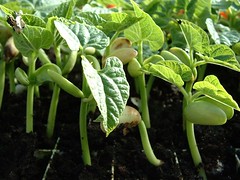| Young beans (Photo credit: Nick Saltmarsh) |
The first thing most people want to know when they’re just starting out in organic gardening is how can they keep their garden from being overrun by pests and diseases if they don’t use chemical compounds.
There are organic pesticides, but an occasional bug in your garden doesn’t mean you have to immediately rush to get rid of it. It depends on the type and severity of the problem as to how aggressively you treat it.
One thing that’s good to do when planting an organic garden is to diversify the plants. Don’t plant row after row of one type – instead, vary the plantings. Harmful insects are usually attracted to a large amount of the same plants in one place, so placing them randomly and with other plants will help ward off pests - plus your garden will look more interesting!
If you do need to use an organic or natural pesticide, be sure to choose one that targets your specific problem. Some organic pesticides are used to get rid of bacteria and others kill harmful pests. Look online to get the information you need about your particular type of problem or check with a nursery. We've also got some helpful resources on our website at www.newholisticliving.com/sustainablegardening.html.
| (Photo credit: Wikipedia) |
One myth about organic gardening is that you’ll just have to accept the fact that the produce and flowers from your garden won’t be as “pretty” and will be bug-ridden. That’s just not true. If you carefully inspect your garden periodically, you should be able to produce gorgeous and bug-free vegetables, plants and flowers.
Let your organic gardening experience be a great one by not obsessing too much about bugs, fungus and bacteria. Just be observant and take preventative measures to ensure your garden is the best and most productive it can be.



No comments:
Post a Comment